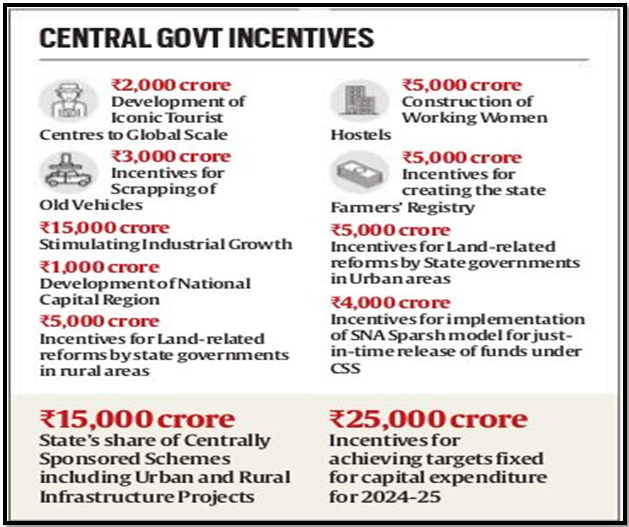CENTRE ALLOCATES ₹10,000 CRORE FOR LAND REFORMS
Syllabus:
- GS 2: Issues related to women
- GS 3: Land reform
Why in the News?
The Centre’s allocation of Rs 10,000 crore for land reforms and Rs 5,000 crore for a Farmers’ Registry in FY25 highlights significant incentives for state-driven rural and urban development.
Source: Indian Express
Introduction
- The Government of India has announced a significant financial boost to states in FY25, with Rs 10,000 crore earmarked for land-related reforms and Rs 5,000 crore for the creation of a Farmers’ Registry.
- These funds, provided under the Scheme for Special Assistance to States for Capital Investment 2024-25, are part of a broader strategy to modernize land administration, enhance urban and rural infrastructure, and stimulate economic growth.
Scheme for Special Assistance to States for Capital Investment
Key Components
|
Budget Announcements for Land Reforms and Women’s Hostels
Land-Related Reforms
- In her Budget Speech on July 23, Finance Minister Nirmala Sitharaman outlined significant financial outlays to incentivize land-related reforms by state governments.
Key measures include:
- Farmer and Land Registries: Incorporating details of 6 crore farmers and their lands into comprehensive registries.
- Unique Land Parcel Identification Number (ULPIN): Implementing ULPIN or Bhu-Aadhaar for unique identification of land parcels.
- Digitization and Survey: Digitizing cadastral maps, surveying land sub-divisions according to current ownership, and establishing land registries in rural areas.
Urban Land Record Digitization
- GIS Mapping: Digitizing land records using Geographic Information System (GIS) mapping.
- IT-Based Property Administration: Creating IT-based systems for managing property records, updates, and tax administration.
Support for Working Women
- Working Women’s Hostels: Additionally, the Centre has allocated Rs 5,000 crore for Establishing hostels in collaboration with industries to support women’s workforce participation.
- Crèches: Setting up crèches to facilitate better work-life balance for working mothers.
- These initiatives aim to enhance efficiency in land management and support women in the workforce.
Land and Funding Guidelines for Working Women’s Hostels
Land Provision and PPP Model
- Land Allocation: The state governments are responsible for providing land for the construction of working women’s hostels either free of cost or by covering the acquisition costs.
- Public-Private Partnership (PPP): States must use a PPP model for the hostels’ operation and maintenance. While the state government will retain ownership, a private entity will handle the day-to-day management.
Funding Allocation
- Uttar Pradesh: The state will receive the largest share, amounting to Rs 382 crore.
- Madhya Pradesh: The state is allocated Rs 284 crore.
- Assam: The state will receive Rs 226 crore.
Fiscal Support for Key Initiatives
Tourism and Industrial Growth
- Iconic Tourist Centers: Rs 2,000 crore will be allocated to develop globally recognized tourist centers.
- Industrial Stimulus: Rs 15,000 crore set aside to boost industrial growth.
Vehicle Scrapping and Infrastructure
- Old Vehicle Scrapping Incentives: Rs 3,000 crore for encouraging the scrapping of old vehicles.
- National Capital Region (NCR) Development: Rs 1,000 crore dedicated to NCR development, equally divided among Haryana, Uttar Pradesh, and Rajasthan.
State and Scheme Incentives
- Centrally Sponsored Schemes: Rs 15,000 crore for states’ shares in urban and rural infrastructure projects.
- SNA Sparsh Model Implementation: Rs 4,000 crore in incentives for efficient fund release under Centrally Sponsored Schemes.
- Capital Expenditure Targets: Rs 25,000 crore allocated as incentives for meeting capital expenditure targets for 2024-25.
Impacts of the New Initiatives on Various Sectors
Land Administration and Property Management
Current Issues
- Fragmented Land Records: Many states have outdated or incomplete land records.
- Inefficient Land Dispute Resolution: Discrepancies in land records lead to frequent disputes.
Impact of Initiatives
- Improved Accuracy and Efficiency: The digitization of land records and implementation of Unique Land Parcel Identification Number (ULPIN) will streamline land management, reduce disputes, and enhance transparency.
- Enhanced Urban Planning: GIS mapping and updated property records will support better urban planning and tax administration.
Agriculture and Farmers’ Welfare
Current Issues
- Lack of Comprehensive Farmer Data: Incomplete data on farmers and their lands hampers targeted policy implementation.
- Limited Access to Financial Support: Farmers face difficulties accessing financial and technical support due to fragmented data.
Impact of Initiatives
- Better Targeted Support: The creation of a Farmers’ Registry will centralize data, enabling more effective support and subsidies.
- Enhanced Policy Implementation: Accurate records will improve the design and execution of agricultural policies and schemes.
Women’s Workforce Participation
Current Issues
- Limited Infrastructure for Working Women: There is a lack of adequate facilities such as hostels and crèches.
- Work-Life Balance Challenges: Working women often struggle with balancing professional and personal responsibilities due to insufficient support systems.
Impact of Initiatives
- Improved Work Environment: Construction of working women’s hostels and crèches will provide necessary support, encouraging higher female participation in the workforce.
- Enhanced Employment Opportunities: By offering secure and supportive facilities, more women will be able to join and remain in the workforce.
Infrastructure Development and Economic Growth
Current Issues
- Outdated Infrastructure: Many regions face challenges with aging infrastructure impacting economic activities.
- Regional Disparities: Uneven development across states hinders balanced economic growth.
Impact of Initiatives
- Boosted Industrial Growth: Funding for industrial growth and infrastructure projects will stimulate economic activities and create jobs.
- Balanced Regional Development: Allocation of funds for iconic tourist centers and the National Capital Region (NCR) will promote balanced development and regional equity.
Conclusion
The Centre’s significant funding for land reforms, women’s hostels, and infrastructure aims to enhance governance, economic growth, and social inclusion. Moving forward, states should efficiently utilize these funds to achieve developmental goals and foster sustainable progress.
Source:Indian Express
Mains Practice Question:
Discuss the significance of the Scheme for Special Assistance to States for Capital Investment 2024-25 in promoting fiscal decentralization and infrastructure development.
Associated Article:




